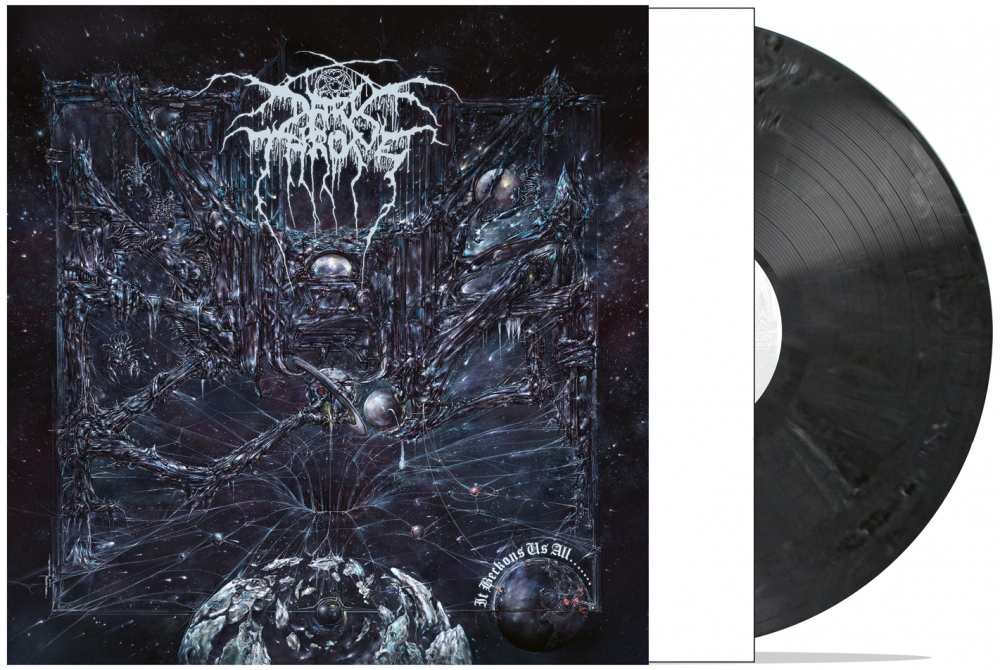Do you remember when an album was a carefully curated collection of tracks on a given format? When bands released records free from the now ubiquitous bonus tracks, super-deluxe editions and digital fan packs? Mastadon do and so, in 2017, the band are back with a brand-new album that stands (or falls) entirely upon its own merits. Foolish colour-in vinyl album sleeve aside (available with the vinyl edition only through the band’s website) this is one of the first high profile releases in years to simply be released as is. It may not seem a big deal, but for music fans who enjoy records that are deliberately sequenced and developed, it feels like a step towards recognising the album for being the art form that it is.
‘Emperor of sand’ sees Mastadon continue the trajectory that they originally plotted on the sublime ‘Crack the Skye’. Somewhat removed from the sludge-informed riffage of ‘Leviathan’ and ‘Blood Mountain’, ‘Emperor of sand’ retains a link to heavier pastures, but time and again the band prefer to push their music in a more progressive direction with melody and diversity given far greater precedent than sheer weight of guitars. Very much a coherent collection, ‘Emperor of sand’ takes the listener on a journey into the heart of Mastadon’s eerie world and from the moment the sound of Eastern chimes announces the surging riffs of ‘Sultan’s curse’, it’s clear that Mastadon are keen to build an atmosphere around the listener. Redolent of hot, spiced winds and arid landscapes, ‘Sultan’s curse’ is both the Mastadon familiar to long-time fans and a gateway into the new album – an album that manages to keep a few surprises hidden at first listen and one that also grows considerably upon repeat exposure. The choice of Brendan O’Brian (Pearl Jam, soundgraden, Aerosmith) has allowed the band to build upon the classic rock heritage that has always lain at the core of their music, and the increasingly progressive tendencies of the band are given full reign by the time that Mastadon conclude this most impressive of opening tracks. More direct but with a pop, rather than metal, edge, ‘Show yourself’ is one of those taut rockers which Mastadon do so well. It doesn’t seem to sit well with the opening number initially, but with subsequent listens the band’s seemingly ad hoc sequencing starts to make sense as the track dips and weaves between the obvious and the oblique. Following track, ‘Precious stones’ makes it clear that the band are indeed playing the long game with ‘Emperor of sand’, the elastic riffs of Brent Hinds and Bill Kelliher writhing around Brann Dailor’s energetically atypical drum patterns. Few bands can engage so impressively with awkward time signatures and structures whilst still maintaining a coherent melodic identity, and yet Mastadon have based their career upon it and if you’re not hooked by the conclusion of the song, you never will be. Emerging from a dark fuzz, ‘Steambreather’ is an album highlight boasting some truly brilliant lead guitar work and ambient touches that truly make the song. Also building from a scree of noise, ‘roots remain’, when it finally hits, hits with surprising force. Brendan may have spent time coaxing warmer tones out of the band’s amps, but he’s not afraid to give them surprising depth and space when they do need to unleash a killer punch, although the vocals remain gruffly melodic. The first half of the album comes to a halt with the art-rock awkwardness of ‘word to the wise’, a twisted, contortionist’s nightmare of a track that does much to give Brann a tough workout on the drums.
The second half of the album kicks off with the tightly wound rocker ‘Ancient Kingdom’, a track that harks back to ‘Crack the Skye’ with its rich tapestry of instrumentation and gorgeous melodic flourishes. The oddly titled and densely-packed ‘clandestiny’ seems to tackle cult logic with its “give your life so I can breathe” mantra whilst Brutal Truth’s Kevin Sharp appears on the grinding hell of ‘Andromeda’, a track that sees the album reach its heaviest. Neurosis’ Scott Kelly, who has guested on almost every Mastadon album, brings his earthen tones to bear on ‘Scorpion breath’, a short, sludge-informed track that, thanks to Brann’s increasingly tribal percussion, draws a line back to Neurosis’ own ‘a sun that never sets’. A potent track, it says much of the quality of the album that surrounds it that it is not a highlight. The record draws to a close with the beautiful ‘Jaguar god’, a dreamy, ethereal epic that traverses great distances over the course of its six minutes. Benefitting from Michael Keneally’s keyboards, it’s a stunning finale to what is, arguably, Mastadon’s finest record since ‘Crack the Skye’.
Long one of rock’s most inventive bands, Mastadon exist in a realm of one, outside of the scope of any mere genre heading. Although Mastadon have never released a bad album, the quality of ‘Crack the Skye’ was such that the subsequent albums suffered by comparison. In ‘Emperor of sand’, however, the band have produced their most consistent offering since that majestic masterpiece and their decision to release the record shorn of the promotional antics that so typically surround releases was a brave one. A beautifully coherent album that invites the listener to embark on a journey to far flung lands, ‘Emperor of sand’ is perfectly represented by the artwork that adorns its cover and stands as a truly magnificent feat of creation. 10











Leave a Reply